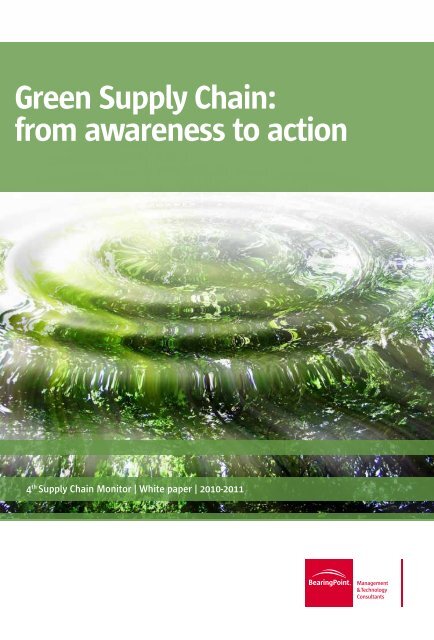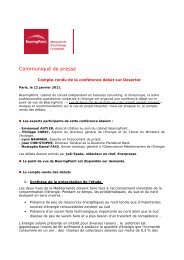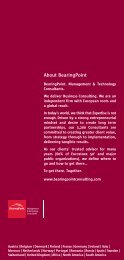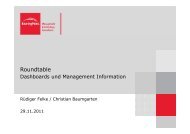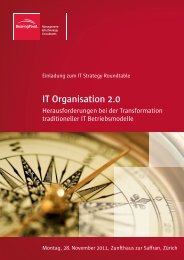Executive summary - BearingPoint
Executive summary - BearingPoint
Executive summary - BearingPoint
Create successful ePaper yourself
Turn your PDF publications into a flip-book with our unique Google optimized e-Paper software.
Green Supply Chain:<br />
from awareness to action<br />
4 th Supply Chain Monitor | White paper | 2010-2011
4 th Supply Chain Monitor<br />
<strong>BearingPoint</strong><br />
Summary<br />
Editorial… …………………………………………………………………………………………………………………………………………………… 4<br />
… Acknowledgments………………………………………………………………………………………………………………………………………… 5<br />
… ……<br />
… <strong>Executive</strong> <strong>summary</strong>…………………………………………………………………………………………………………………………… 6<br />
… … Moving…forward…………………………………………………………………………………………………………………………………… 6<br />
… … The…new…guidelines… …………………………………………………………………………………………………………………………… 9<br />
… 1.…Green Supply Chain strategy and models… ………………………………………………………………… 12<br />
… … Context…and…concept… ……………………………………………………………………………………………………………………… 12<br />
… … Implementing…a…new…strategy…………………………………………………………………………………………………………… 14<br />
… … The…green…Supply…Chain…model… ………………………………………………………………………………………………………… 16<br />
… … Regulation…framework…… …………………………………………………………………………………………………………………… 20<br />
…<br />
… 2.…Green actions per Supply Chain segment… ………………………………………………………………… 26<br />
… … Eco-design………………………………………………………………………………………………………………………………………… 26<br />
… … Sustainable…purchasing……………………………………………………………………………………………………………………… 32<br />
… … Green…manufacturing………………………………………………………………………………………………………………………… 36<br />
… … Green…logistics…………………………………………………………………………………………………………………………………… 40…<br />
… … Second…life…logistics…and…operations… ………………………………………………………………………………………………… 44<br />
… 3.…Environmental footprint……………………………………………………………………………………………………… 48<br />
… … Context…and…motivations… ………………………………………………………………………………………………………………… 48<br />
… … Scope,…areas…and…activities…covered…by…assessments… …………………………………………………………………………… 50<br />
… … Improvement…axes…………………………………………………………………………………………………………………………… 52<br />
… … Actions…efficiency… …………………………………………………………………………………………………………………………… 53<br />
… … Initial…conclusions:…carbon…accounting…follows…carbon…footprint…………………………………………………………… 53<br />
… … Collaboration,…sharing…and…openness…as…new…vectors…of…competitiveness………………………………………………… 54<br />
… … Concrete…paths…to…action… ………………………………………………………………………………………………………………… 54<br />
… <strong>BearingPoint</strong> capabilities in green Supply Chain… ………………………………………………………………………………………… 56<br />
… Our commitment……………………………………………………………………………………………………………………………………… 62<br />
… Study…methodology… ………………………………………………………………………………………………………………………………… 64<br />
… <strong>BearingPoint</strong>……………………………………………………………………………………………………………………………………………… 66<br />
… Contacts… ………………………………………………………………………………………………………………………………………………… 67<br />
2 3
4 th Supply Chain Monitor<br />
<strong>BearingPoint</strong><br />
Editorial<br />
4 th Supply Chain Monitor<br />
Two years ago, <strong>BearingPoint</strong> delivered its first green Supply Chain survey in collaboration with ESCP Europe and<br />
Supply Chain Magazine. The document highlighted that environmental actions undertaken by European firms were<br />
mostly driven by the need to comply with environmental regulations.<br />
Through this 2010-2011 Monitor we intend to portray the evolution over the past two years in terms of mindset,<br />
maturity and actions efficiency. This survey explores the green Supply Chain practices in Europe, in order to identify<br />
the significant improvements in the most representative industries. The results clearly underline a growing interest<br />
of executive managements in developing products with a low environmental impact. What was seen as a constraint<br />
is now considered as an opportunity.<br />
European companies have definitely embarked on the green Supply Chain train. They see it as a tremendous<br />
opportunity to create value for their activities on the long term. However, this evolution also implies getting over the<br />
classical customer-supplier relationship model, and thinking about new internal and external collaborative forms.<br />
Some companies make the most of the efforts made for green Supply Chain initiatives to enhance their value<br />
proposition. They rely on various media channels to promote an eco-responsible and innovative image to<br />
shareholders, final and intermediary customers, end consumers and to their own staff. The increasing quality of<br />
corporate sustainable reports, especially on the Supply Chain related issues, highlights how companies want to<br />
value their commitment to implementing their green actions.<br />
Global companies are increasingly aware of the challenges and trade-offs that face their evermore complex,<br />
competitive and transparent Supply Chains. Supply Chain classical strategies focus on costs, time-efficient movement<br />
and coordination of goods and services from upstream suppliers to downstream consumers. For sustainable leaders<br />
these strategies are not enough and they expect to extend theirs by involving suppliers in emerging economies, but<br />
also their suppliers’ suppliers and in tiers beyond that.<br />
Companies are stepping up their environmental programmes, where green actions populate various stages of the<br />
Supply Chain. The objectives are to minimise risks, make long term profits and be compliant to the regulations.<br />
How mature are green actions operated by companies?<br />
How have companies implemented built-to-last green processes?<br />
How is this new imperative becoming a source of innovation rather than a constraint?<br />
"Sustainable Development is a key word of our strategy and its application is a priority for our group and for all<br />
international companies." (Metro Group CEO Eckhard Cordes)<br />
Matthias Loebich<br />
Partner<br />
Supply Chain<br />
<strong>BearingPoint</strong><br />
Yvon Donval<br />
Partner<br />
Supply Chain<br />
<strong>BearingPoint</strong><br />
Xavier Houot<br />
Partner<br />
Sustainable Development<br />
<strong>BearingPoint</strong><br />
Acknowledgments<br />
Green…Supply…Chain:…from…awareness…to…action…<br />
We would like to thank all companies that took part in our survey, especially those who accepted to be interviewed.<br />
We would also like to thank the following for their active contribution to this white paper:<br />
• Pierre Arbeille (France)<br />
• Jean-Baptiste Bacou (France)<br />
• Eric Bohner (Belgium)<br />
• Jean-Pierre Cannizzo (France)<br />
• Stephen Coy (United Kingdom)<br />
• Charles de Monchy (Netherlands)<br />
• Yvon Donval (France)<br />
• Antoine Gaudron (France)<br />
• Matthias Goertzen (Germany)<br />
• Xavier Houot (France)<br />
• Pierre Joubert (France)<br />
• Sergey Kuzovkin (Russia)<br />
• Sébastien Lecas (United Kingdom)<br />
• Matthias Loebich (Germany)<br />
• Per Staffansson (Sweden)<br />
• Serge Weibel (France)<br />
• Matthias Wohlfahrt (Germany)<br />
Finally, thank you to the Marketing and Communication team: Thierry Lalande, Stéphanie Lesdos et Angélique Tourneux<br />
4 5
4 th Supply Chain Monitor<br />
<strong>BearingPoint</strong><br />
GREEN SUPPLY CHAIN:<br />
A NEW DEAL<br />
Moving forward<br />
The 2008 survey underlined that environmental<br />
regulations adopted in Europe (REACH, WEEE, RoHS,<br />
European Union Emissions Trading Scheme (EU ETS))<br />
created a sense of urgency. Companies had troubles<br />
defining priorities and the way to handle necessary<br />
actions. In 2010, an inflexion has clearly become<br />
apparent. The emergence of Sustainable Development<br />
departments and the rising consciousness of<br />
environmental issues among executive managements<br />
enabled a better understanding of regulation<br />
mechanisms and their consequences. Environmental<br />
actions presently address new constraints and<br />
motives, which are more mature and integrated to<br />
companies’ decision processes.<br />
Improvement of the company brand image and<br />
executive sponsorship are the two main reasons for<br />
launching green actions. Initiated by an individual<br />
or a department, they are now supported by<br />
executive managements. The support of companies’<br />
management committees significantly facilitates and<br />
often guarantees the funding and implementation of<br />
green projects.<br />
<strong>Executive</strong><br />
<strong>summary</strong><br />
The rising interests and motivations are an indication<br />
of a higher maturity of companies. Our analysis of the<br />
results shows a correlation between the perception<br />
of this maturity and the political and cultural<br />
emphasis of European countries over environmental<br />
issues. For instance, German companies believe their<br />
green Supply Chain is 78% matured. This positive<br />
perception confirms the government's position about<br />
6 7
4 th Supply Chain Monitor<br />
<strong>BearingPoint</strong><br />
the reconciliation of economical and environmental<br />
motives; progress made thanks to the German law on<br />
renewable energies illustrates this reconciliation.<br />
Looking at the bigger picture about the new challenges<br />
of green Supply Chain: the conditions for a successful<br />
implementation are now gathered!<br />
Motivations to implement green actions<br />
Environmental regulations<br />
Brand image improvement<br />
Innovation (product & processes)<br />
Costs reduction<br />
<strong>Executive</strong> board decision<br />
New markets acquisition<br />
Competitors' pressure<br />
Opinion leaders pressure<br />
Others<br />
0% 20% 40% 60% 80% 100%<br />
Brand image improvement<br />
<strong>Executive</strong> board decision<br />
Environmental regulations<br />
Innovation (product & processes)<br />
Costs reduction<br />
Competitors' pressure<br />
New markets acquisition<br />
Opinion leaders pressure<br />
Others<br />
This is confirmed by the facts, as two thirds of<br />
companies have intensified their green actions over<br />
the past three years. As many consider that green<br />
Supply Chain is a strategic priority.<br />
0% 20% 40% 60% 80% 100%<br />
2008<br />
Significant rise<br />
Significant decrease<br />
2010<br />
Source: <strong>BearingPoint</strong>, Green Supply Chain Monitor, 2010-2011<br />
Green Supply Chain is a strategic priority, immediately or<br />
on the short run (positive answers)<br />
100%<br />
80%<br />
60%<br />
40%<br />
20%<br />
0%<br />
Scandinavia United<br />
Kingdom<br />
& Ireland<br />
* Germany, Switzerland and Austria<br />
GSA * France<br />
Benelux<br />
Source: <strong>BearingPoint</strong>, Green Supply Chain Monitor, 2010-2011<br />
Practically, the conditions of the implementation turn<br />
towards mastering the risks of green Supply Chain.<br />
For some business sectors like large retail players, the<br />
environmental impact of their suppliers accounts for<br />
95%oftheirtotalimpact.Suchgroupsoughttomanage<br />
their exposition to specific risks. Risks can be linked to<br />
the company brand image (atmospheric discharges<br />
due to bitumen sand extraction, deforestation for<br />
palm oil tree plantations,…), compliance issues with<br />
European laws (REACH, RoHS,…) or customers’ health<br />
and potential penalties.<br />
The new guidelines<br />
New directions for green Supply Chain<br />
Beyond the various initiatives that the media daily<br />
present or that were mentioned by the respondents<br />
of the survey, environmental strategies are taking<br />
shape. Companies’ trends linked to green Supply<br />
Chain are setting up and demonstrate their maturity.<br />
Convergence of the economical and environmental<br />
interests<br />
In this matter, the short term is sometimes sacrificed…<br />
More than one third of the interviewed companies<br />
declare being ready to start up environmental actions<br />
in spite of their low present profitability, provided<br />
they create value in the medium term.<br />
Beyond this trade-off, the main change is the<br />
perception of companies about a real convergence<br />
between economical and environmental challenges<br />
for their Supply Chain. Most of the respondents<br />
Green…Supply…Chain:…from…awareness…to…action…<br />
Companies that intensified their green Supply Chain actions<br />
during the past 3 years (positive answers)<br />
100%<br />
Source: <strong>BearingPoint</strong>, Green Supply Chain Monitor, 2010-2011<br />
8 9<br />
80%<br />
60%<br />
40%<br />
20%<br />
0% Scandinavia United<br />
Kingdom<br />
& Ireland<br />
* Germany, Switzerland and Austria<br />
GSA * France<br />
Benelux<br />
declare that green Supply Chain is a true economical<br />
lever (70% of the companies) and a source of easily<br />
measurable profits (56%). For 47% of the companies,<br />
the return on investment is reached before three<br />
years.<br />
Environmental commitment planned on the long run<br />
Taking actions is not the result of a temporary trend!<br />
Companies that chose to implement a green Supply<br />
Chain invest and commit in the matter on the long<br />
run: for these companies which already measured<br />
their carbon footprint, 70% evaluate it at least yearly.<br />
The proven ability of green initiatives to face the<br />
consequences of the recent economical crisis also<br />
proves the sustainability of environmental actions.<br />
66% of companies declare that the crisis did not have<br />
a braking effect on planned and on-going initiatives,<br />
and that they even accelerated most of them.<br />
Ecology as a performance indicator for Supply Chain<br />
Environmental actions in Supply Chain have to be<br />
assessed. To do so green key indicators and metrics are<br />
introduced. KPI’s like the share of recycled packaging<br />
material or the share of trucks better than Euro-class 4<br />
come into consideration. The measure of performance<br />
is essential to gain the trust of executive committees<br />
and to meet regulations requirements. Furthermore<br />
green KPI’s become selection criteria for companies<br />
and suppliers thus a critical success and competition<br />
factor. More than half of European companies adopted<br />
this approach, Scandinavian companies being leaders<br />
as 77% of them already use green criteria.
4 th Supply Chain Monitor<br />
<strong>BearingPoint</strong><br />
Operational trends<br />
Eco-design: a must for the development of activities<br />
"80% of the environmental impact of a product is<br />
determined during its design" (German Environment<br />
Agency). We believe this percentage is underevaluated.<br />
Anticipating the environmental footprint of<br />
a product from the very first steps of its development<br />
(eco-design approach) is an essential element<br />
to take into account, considering the actions of<br />
markets, competitors and national and supranational<br />
authorities.<br />
Attentive to the new eco-responsible desires of their<br />
clients, some companies don’t hesitate anymore in<br />
selling an eco-designed product at a higher price to<br />
gain market shares. Although few of the interviewed<br />
companies claim having taken the path of eco-design,<br />
results are very encouraging for those that did as<br />
the main objectives they had when beginning are<br />
generally reached: compliance with laws, brand image<br />
improvement, meeting final customer’s requirements<br />
or recycling optimisation.<br />
Procurement: the green requirements in sustainable<br />
procurement<br />
Beyond requirements that procurement departments<br />
have traditionally been promoting over the years,<br />
such as the respect of work conditions and nondiscrimination,<br />
new issues arise about reinforcing<br />
environmental requirements towards suppliers.<br />
According to the results of our survey, two thirds<br />
of companies adopted or plan to adopt a green<br />
policy for their purchases. This approach enables<br />
better compliance with existing norms (e.g. REACH),<br />
improvement of brand image for consumers and better<br />
ranking by non-financial notation organisations.<br />
Buyers are preferably choosing suppliers with<br />
certified processes (ISO 14001 for instance), but there<br />
is more in the balance: companies also encourage<br />
suppliers who have a low raw material consumption,<br />
controlled emissions and pollution levels and raw<br />
material tracking. Furthermore they tend to select<br />
products made out of a large proportion of recycled<br />
and recyclable materials, and stamped by reliable<br />
eco-labels (Energy Star for instance being the most<br />
recognised label in the energy consumption field).<br />
Lean manufacturing at the time of green Supply Chain<br />
Cost-cutting culture and industrial know-how have<br />
been associated for several decades. For 5 to 10<br />
years, depending on the sectors, broadcasting and<br />
implementation of "lean" techniques and practices<br />
have known a further development.<br />
The first intentions in the 80s were cost-cutting<br />
through the hunt of all kinds of waste and through the<br />
use of the minimum resources: the expected result<br />
was operational efficiency. They remain unchanged,<br />
but are now promoted inside the company as an<br />
environmental necessity, and enable to give a more<br />
practical view of the company actions.<br />
Logistics: classical optimisation approaches, source of<br />
green quick wins<br />
In the past, classical optimisation was driven by costs<br />
and lead time. Nowadays a third dimension appears:<br />
the environmental impact. Especially the increases of<br />
energy costs in 2008 and the European Union Emissions<br />
Trading Scheme (EU ETS) drove the need for logistics<br />
optimisation. There are various ways to optimise from<br />
processes until technical improvements. The good<br />
news is every company can launch logistics initiatives<br />
to reduce environmental impacts. And quick wins in<br />
green projects do exist.<br />
Carbon footprint: measurement as a prerequisite for<br />
the optimisation<br />
Defining a baseline by measuring an initial carbon<br />
footprint is the prerequisite for setting up realistic<br />
reduction goals. More and more companies realise<br />
that virtual, non hard fact based reduction goals cause<br />
more harm than good. It highlights the actions to<br />
carry out in order to better control the environmental<br />
impact and optimise operational costs. 80% of the<br />
companies that measured their carbon footprint<br />
identified immediately applicable improvement<br />
initiatives that led to concrete improvements, for<br />
instance to diminish resources consumption and get<br />
rid of waste.<br />
Beyond action, communication<br />
Communication is also part of the economical<br />
stakes of a green Supply Chain. Communicate on<br />
the environmental improvements made for the "Last<br />
Mile" is a strong competitive argument for a logistics<br />
contractor. That way the suppliers can give value to<br />
their know-how and improve their carbon footprint<br />
without degrading their performances.<br />
Showing that your company strategically cares about<br />
the environment through the definition of its products<br />
use, or through the choice of its components,<br />
suppliers, packaging, distribution network, has<br />
become an asset… and will most certainly be a survival<br />
need tomorrow! ■<br />
Green…Supply…Chain:…from…awareness…to…action…<br />
Companies committed to measuring their carbon footprint<br />
* Germany, Switzerland and Austria<br />
Source: <strong>BearingPoint</strong>, Green Supply Chain Monitor, 2010-2011<br />
10 11<br />
60%<br />
40%<br />
20%<br />
0% Scandinavia United<br />
Kingdom<br />
& Ireland<br />
40%<br />
30%<br />
20%<br />
10%<br />
0%<br />
GSA * France<br />
Benelux<br />
Companies that don't measure yet but intend to do it<br />
within 3 years<br />
Scandinavia United<br />
Kingdom<br />
& Ireland<br />
* Germany, Switzerland and Austria<br />
GSA * France<br />
Benelux<br />
Source: <strong>BearingPoint</strong>, Green Supply Chain Monitor, 2010-2011
4 th Supply Chain Monitor<br />
<strong>BearingPoint</strong><br />
Study…methodology<br />
<strong>BearingPoint</strong> has led the Supply Chain Monitor for the fourth consecutive year. Thanks to these initiatives, the<br />
following themes have been approached:<br />
• 2010-2011: Green Supply Chain, from awareness to action;<br />
• 2009: Risks management;<br />
• 2008: Green Supply Chain, companies’ stakes and maturity;<br />
• 2007: Sourcing in Low Cost countries.<br />
There are numerous objectives of the Monitor:<br />
• Make available a long-term reflection plan for Supply Chain;<br />
• Provide the results of a European poll;<br />
• Write a white paper to record the trends, the actions to be pursued and the related analysis;<br />
• Share the results during an event gathering leaders of the field.<br />
To reach these objectives, a three-step approach was introduced for this edition:<br />
1. Conduct a quantitative study among about 600 European decision-makers with a position within Supply Chain,<br />
Sustainable Development or Industrial Divisions (Novamétrie study);<br />
2. Improve the investigation through about forty interviews with managers of big and innovative companies;<br />
3. Bring a complementary perspective integrating feedbacks from our recent missions.<br />
Structure of the questionnaire’s sample<br />
The sample brings together the 582 companies that answered the questionnaire online or by phone.<br />
Ditribution per region<br />
29%<br />
11%<br />
29%<br />
31%<br />
France, Benelux<br />
Germany,<br />
Switzerland, Austria<br />
United Kingdom,<br />
Ireland<br />
Norway, Sweden,<br />
Denmark, Finland<br />
Source: <strong>BearingPoint</strong>, Green Supply Chain Monitor, 2010-2011<br />
Distribution per country<br />
6%<br />
23%<br />
1%<br />
10%<br />
25%<br />
23%<br />
6%<br />
6%<br />
Germany<br />
Austria<br />
Belgium<br />
France<br />
Luxembourg<br />
United Kingdom<br />
Ireland<br />
Scandinavia<br />
Source: <strong>BearingPoint</strong>, Green Supply Chain Monitor, 2010-2011<br />
We have succeeded in maintaining a sample group of answerers equally distributed in the different economic sectors.<br />
We were thus able to have more representative results of the global situation and to focus on some business sectors.<br />
Distribution per sector<br />
Consumer goods, FMCG<br />
Transports<br />
Metallurgy<br />
Construction<br />
Automotive<br />
Retail/Specialised distribution<br />
Industrial goods<br />
Energy and utilities<br />
Chemicals<br />
IT/Electronics<br />
Pharmaceuticals<br />
Aeronautics/Defense<br />
Textile<br />
Telecommunications<br />
Financial services<br />
Public sector<br />
0% 2% 4% 6% 8%<br />
10% 12% 14% 16% 18%<br />
Source: <strong>BearingPoint</strong>, Green Supply Chain Monitor, 2010-2011<br />
A good proof of the companie's growing interest in Sustainable Development is that Sustainable Development<br />
departments are structured. They are now the main answerers, in front of the Supply Chain departments.<br />
Distribution per department<br />
Sustainable Development<br />
Supply Chain<br />
COO<br />
Quality<br />
Purchasing<br />
CEO<br />
Other<br />
0% 5% 10% 15% 20% 25%<br />
Green…Supply…Chain:…from…awareness…to…action…<br />
30% 35% 40%<br />
Source: <strong>BearingPoint</strong>, Green Supply Chain Monitor, 2010-2011<br />
64 65
4 th Supply Chain Monitor<br />
<strong>BearingPoint</strong><br />
<strong>BearingPoint</strong><br />
<strong>BearingPoint</strong>.…Management…&…Technology…Consultants.…<br />
We…deliver…Business…Consulting.…We…are…an…independent…firm…with…European…roots…and…a…global…reach.<br />
In…today’s…world,…we…think…that…Expertise…is…not…enough.…Driven…by…a…strong…entrepreneurial…mindset…and…desire…to…<br />
create…long…term…partnerships,…our…3200…Consultants…are…committed…to…creating…greater…client…value,…from…strategy…<br />
through…to…implementation,…delivering…tangible…results.…<br />
As…our…clients’…trusted…advisor…for…many…years…(60%…of…Eurostoxx…50’…and…major…public…organisations),…we…define…<br />
where…to…go…and…how…to…get…there……<br />
<strong>BearingPoint</strong>…has…started…a…long-term…approach…to…analyse…practices…and…communication…about…significant…progresses…<br />
in…Sustainable…Development…through:<br />
•…Annual…Monitors:…Supply…Chain,…Purchasing,…Innovation,…Client…relationship,…etc.;<br />
•…The…<strong>BearingPoint</strong>…Institute,…our…innovation…centre…to…enhance…the…strategic…thinking…of…our…clients;<br />
•…Client…stories…from…our…engagement…teams…day-to-day…work.<br />
To get there. Together.<br />
For…more…information:…www.bearingpointconsulting.com<br />
Austria…|…Belgium…|…Denmark…|…Finland…|…France…|…Germany…|…Ireland…|…Italy…|…Morocco…|…Netherlands…|…Norway…|…Portugal…|…Romania…|…<br />
Russia…|…Spain…|…Sweden…|…Switzerland…|…United…Kingdom…|…Africa…|…North…America…|…South…America<br />
<strong>BearingPoint</strong> has written this document with the utmost care. However, given the significant amount of information contained and handled, the<br />
authors cannot guarantee the reliability, completeness and accuracy of the said information.<br />
Consequently, the authors cannot take on any responsibility as to the information in this document or its use.<br />
Furthermore, any decision made by a reader on the basis of this document or the information it contains and/or any use made of this information<br />
and/or this document, is under the reader’s sole responsibility and does not necessarily reflect the views of the authors.<br />
© 2011 - <strong>BearingPoint</strong> France SAS.<br />
All reproduction rights reserved.<br />
All rights reserved. Names, trademarks and/or any other distinguishing marks of companies or products mentioned in this document are the property<br />
of their respective owners. <strong>BearingPoint</strong> disclaims all responsibility in case of mistake or omission.<br />
Credit Photo: Fotolia<br />
Contacts<br />
France<br />
Yvon Donval<br />
Partner…<br />
+33…6…10…84…38…51…<br />
yvon.donval@bearingpointconsulting.com<br />
Serge Weibel<br />
Partner<br />
+33…6…24…67…11…38<br />
serge.weibel@bearingpointconsulting.com<br />
Germany, Switzerland & Austria<br />
Matthias Lœbich<br />
Partner…<br />
+49…89…54033…6126…<br />
matthias.lœbich@bearingpointconsulting.com<br />
Matthias Gœrtzen<br />
Partner…<br />
+49…69…13022…1336…<br />
matthias.gœrtzen@bearingpointconsulting.com<br />
Sweden, Denmark, Norway & Finland<br />
Per Staffansson<br />
Director<br />
+46…733…211…676…<br />
per.staffansson@bearingpointconsulting.com<br />
Netherlands<br />
Charles de Monchy<br />
Partner<br />
+31…20…504…9067…<br />
charles.demonchy@bearingpointconsulting.com<br />
United Kingdom & Ireland<br />
Stephen Coy<br />
+44…203…206…9655…<br />
stephen.coy@bearingpointconsulting.com<br />
Green…Supply…Chain:…from…awareness…to…action…<br />
Xavier Houot<br />
Partner…<br />
+33…6…24…39…41…89…<br />
xavier.houot@bearingpointconsulting.com<br />
Matthias Wohlfahrt<br />
+49…30…88004…5890<br />
matthias.wohlfahrt@bearingpointconsulting.com<br />
Belgium<br />
Eric Bohner<br />
Partner<br />
+32…2…712…6969…<br />
eric.bohner@bearingpointconsulting.com<br />
Russia<br />
Sergey Kuzovkin<br />
Partner<br />
+7…495…937…4466…<br />
sergey.kuzovkin@bearingpointconsulting.com<br />
Morocco<br />
Youssef Harouchi<br />
Senior…Advisor<br />
+212…661…18…53…17…<br />
ce-youssef.harouchi@bearingpointconsulting.com<br />
66 67


